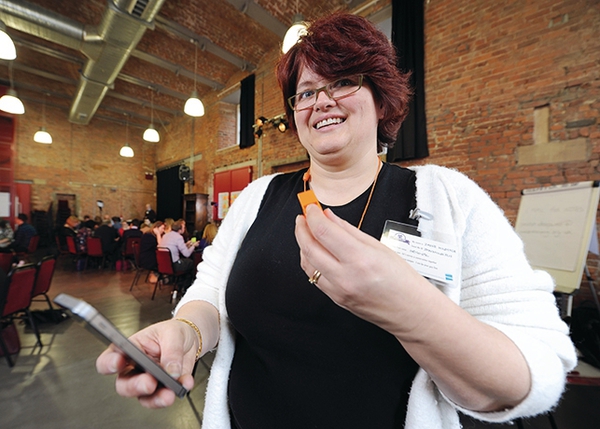Breaking the mould
By launching private rented sector arm Fizzy Living, Geeta Nanda has led Thames Valley Homes in an ambitious new direction. Here she tells Jess McCabe why she’s not worried the move will change the identity of the sector as a whole
Geeta Nanda is walking out the door of the Twickenham offices of the housing association where she presides, when she spots a new receptionist. ‘Hello,’ she says, approaching the desk, ‘are you one of the new apprentices?’
‘Yes,’ the young man confirms shyly, as the silk blouse-clad chief executive shakes his hand. I get the impression he’s only the latest to succumb to the open face and friendly manner of the Thames Valley Housing boss. This encounter is typical of the 48-year-old Londoner: she is a people person, but also a bit of a political operator, deftly highlighting the fact that TVH employs apprentices. Three, in fact.
Perched atop a branch of Waitrose, the 14,500-home housing association - which operates across London and the south east, and which Ms Nanda has led for five-and-a-half years - has recently had a thoroughly modern makeover. We sit down to talk in ‘the hub’ - what in less public relations-obsessed times would have been known as a staff room.
Revamping the brand
Given this, it’s no surprise that TVH is about to rebrand itself. Without giving away too many details, Ms Nanda assures us the housing association won’t be changing its name to a tangentially-related noun, or a word with no capital letters. Her organisation already staked this territory when it hired branding company Heavenly (other jobs include: rebranding the entire country of Wales) to come up with a moniker for its trail-blazing foray into the private rented sector.

What emerged was Fizzy Living, a cutting-edge experiment with private tenants. It might not be clear what the name means (Harry Downes, Fizzy’s managing director, fails to cast much light, saying it was based on ‘a bunch of brand values’). But it’s making waves: Andy Belton, chief operating officer of Notting Hill Housing Group, recently declared at a finance conference in London that Fizzy had ‘won the branding war’, describing it as a ‘wake-up call’ for the housing sector.
It’s certainly one of the most recognisable brands to emerge from the housing sector in recent years.
First impressions of TVH and Ms Nanda mesh together well: the ostentatiously modern setting and energetic chief executive, whose ambitious ideas are opening up a new direction for housing associations, one which many believe will change the identity of the sector to encompass all tenures and define the future of housing.
Already one of the few ethnic minority women to head up a social landlord, and the recipient of an OBE in 2013’s birthday honour’s list, Ms Nanda is frequently tapped as a leader whose star has farther to rise. So who is the woman behind this modernist housing enterprise? And is there any risk of losing touch with its main constituents: tenants more likely to work at than shop in Waitrose?
Perhaps few kids want to be housing officers - or chief executives - when they grow up. Ms Nanda, 48, was no different. Ms Nanda’s parents came to the UK in 1959 - her father was an English teacher but couldn’t get work (‘it wasn’t common for Indians to teach English back then’) - and retrained as an engineer. Her mother was a carer and housewife. Ms Nanda’s own aim was ‘to go into clinical psychology’, she recalls. And after graduating with a degree in psychology from Plymouth University in 1986, she got a job in a psychiatric hospital.
‘It was in the middle of Dartmoor. Everybody was locked up, literally - chained, wailing, [electroconvulsive therapy] treatment. It was the old days. It was really awful and I thought, “this is just not my vision of what I want to do and where I want to be”.’
Finding her calling
And so within a year, Ms Nanda had applied for the graduate trainee programme at Wandsworth Council in south London, on the suggestion of her sister who heard about it through her job at the Greater London Council. Her first placement was in the housing team - and the rest is history. ‘I just really enjoyed housing,’ she says simply. ‘The people. The work.’
Leaving Wandsworth two years’ later, Ms Nanda briefly went into housing research: writing a report for The London Housing Forum - Speaking out - about tenants’ housing problems. Unusually, for the 1980s, she explains the report concentrated not on statistical trends, but interviews with the people affected.
‘I found [working for a local authority] too bureaucratic. Research, I enjoyed, but it was much more project-based,’ she recalls. But soon she took a job as a housing officer at the Notting Hill Housing Trust, and found her niche. ‘I just felt completely at home. And I’ve worked for housing associations ever since.’
As a housing officer in the 1980s, Ms Nanda had ‘a small patch where you did everything… It was a really good grounding for working in housing’.
From there, she worked her way up the ranks. For a time she was a team leader at Notting Hill, then she moved to Ujima where she was deputy housing director for four years (well before the former landlord fell into trouble. Ms Nanda still speaks about the experience with sadness, saying ‘it was a real shame seeing it destroyed’). Jumping from organisation to organisation, she became housing director, then group operations director, before landing at TVH as chief executive. She acknowledges she took ‘quite a linear path up through different organisations’.
‘It’s a good way to do it as well,’ she explains. ‘You do know what it’s like at every level. Being a middle manager, being a front line officer, working in development and also in housing, and then taking senior responsibility.’
She is spoken about as a leading light, but is modest, citing getting her current job as the proudest moment so far. ‘I never expected, or never planned, to become a chief executive, I took each step each time, but actually getting this job was great, it was really great,’ she says.
Ms Nanda has had offers for jobs at bigger organisations, but she brushes away speculation on future top roles. ‘I have lots to do here. People will always speculate once you’ve been somewhere over five years,’ she adds.
A new direction
Ms Nanda’s climb up the career ladder might be conventional, but under her leadership, TVH has found itself at the leading edge of a change in the very identity of the sector. Last year, TVH was one of the first housing associations to commit itself to the private rented sector. Fizzy Living aims to build or buy 1,000 homes for private rent by 2015. Even this commercial, profit-making project, contributes ‘to building more homes as a country’, she says, and, once it starts to make a profit will provide a new source of income to help TVH’s social mission to build affordable rent homes. (Ms Nanda says Fizzy Living is not yet in profit, but this is as planned due to start-up costs, and the individual buildings are exceeding their expected returns of 5 per cent.)

Fizzy Living’s homes, like those in the Canning Town development, offer mid-market rents and extra options such as furniture packages
Fizzy has two buildings comprising 183 flats bought and rented out to 200 tenants, and another two buildings should be completed and handed over by the end of the year.
At the moment, the housing association is in the midst of trying to attract investors like pension funds to inject £200 million in Fizzy and allow it to buy the extra apartment blocks to meet that 2015 target. Courting institutional investors, she says, has been a learning process. ‘It takes longer than you think,’ she laughs. But having already taken a £60 million loan from the Australian investment bank Macquarie, ‘we’re going according to our plan, what we’re trying to do is speed it up by getting investment in quicker,’ she says.
TVH has been participating in government efforts to expand the private rented sector, feeding into a taskforce set up by housing minister Mark Prisk, commenting on proposals and feeding back what investors are looking for, and keeping up to speed on the £1 billion build-to-rent fund, launched in April to provide government backing to development in the private rented sector. However, these are not initiatives that TVH plans to use itself, Ms Nanda says: except as a backstop in case its current fundraising doesn’t come off.
The fund should also help to encourage others in the social housing sector to venture into the private rented sector, she adds. ‘If you’re going to have a sector which is backed by investors then there are a number of things that you need to get in place, which is a number of buildings, and a build-to-rent model, properly designed build-to-rent buildings as well.’
While this blend of social housing’s social purpose with commercial activity has been modelled by TVH, Ms Nanda does not think all housing providers should copy Fizzy. ‘I don’t think we should all try to be the same,’ she exclaims. Fizzy made sense to TVH, because it already has a younger tenant-base, the market-segment targeted by the company: in its Canning Town building, Ms Nanda notes, the average tenant is 30 years old, earns £30,000 and spends 30 per cent of their income on rent. Other landlords have other skills and community needs.
She also dismisses the idea that experiments with the private sector risk changing the nature of her organisation - or the sector as a whole.
‘[Private house builder] Berkeley Homes has taken massive amounts of [Homes and Communities Agency] grant [under the affordable homes programme]. It doesn’t change it as an organisation in terms of what it’s there to do or where it sits in the sector,’ she points out.
Highly commended
Those in the private sector certainly speak highly of Ms Nanda. Stephen Teagle, managing director of affordable housing at house builder Galliford Try, with which TVH has set up a £50 million joint venture to build 117 mixed tenure homes in Slough, says: ‘Geeta is an excellent chief executive,’ and calls her an ‘excellent’ leader for the 21st century.
Steve Douglas, a partner at consultancy Altair, has known Ms Nanda for 20 years. ‘She’s a star of the housing sector. She’s got ideas. She’s thoughtful. She gives generously of her time and her personal energy.’ And Fizzy Living, he adds, ‘has shown real creativity in solving the problems of a generation… It’s got the sector thinking.’

Fizzy Living is run as a completely commercial enterprise. As such, the rents are mid-market, and renters can choose from various plush extras like packs of furniture and high-speed broadband. But after strenuously insisting that the commercial brands can’t be ‘fudged’ with TVH’s social mission, Ms Nanda lightly admits the business does bear the imprint of a socially-conscious landlord. For example, Ms Nanda explains, some of Fizzy’s two-bedroom flats are specifically set up as more affordable shared spaces, with two bathrooms and identically-sized bedrooms.
Already they’ve had tenants in their existing blocks move into shared flats after they lost a job and could no longer afford to rent an apartment on their own. In addition, unlike many private landlords, Fizzy Living isn’t adverse to tenants on housing benefit (although in most cases it’s not relevant as they’re aiming at a wealthier portion of the market). She says: ‘It’s part of our DNA - how can we make this affordable?’
And TVH may be reaching out into the private sphere, but its chief executive is insistent it hasn’t left social and affordable tenants behind. In terms of building new, affordable homes, the association plans to build 500 affordable homes a year for about 10 years.
It seems unlikely this is the last we’ll hear of Ms Nanda, or TVH. But the chief executive says the landlord has ‘got some ideas brewing about what we can do next’.
‘I’m not going to say,’ she admits, laughing. ‘I think it’s absolutely essential we keep coming up with new ideas, because the world is changing. Even if you’re just concerned with managing your stock, you can’t stand still. We should be at the cutting edge.’
A man’s world
Geeta Nanda is one of the few black or minority ethnic women to lead a housing association. ‘The number of times I go into a room and it’s all men, especially in the more commercial sector,’ she observes, before adding, with typical diplomacy, ‘I’m so used to it now it doesn’t bother me at all, and they’re all really nice.’
In the housing sector, she says the lack of diversity at the top is down to fewer opportunities. ‘Our philosophy is about making sure we keep developing people, even if they can’t move into a senior position, so they’re ready when the market starts moving,’ she says.
Given her approachability, Ms Nanda would never be someone you could imagine admitting to a struggle to fit in. But it does sometimes involve a bit of artifice to fit in with the homogenous crowd.
‘I have to support Watford [Football Club], because my son supports Watford,’ she says. ‘So I can talk Chelsea and I can talk Watford because those are his teams, and that’s very useful in some of the settings I go to. Sometimes when I go to a dinner I go, “give me football facts”. And then I just relay them, then I get lost in the conversation, but at least I’ve contributed. So my son’s my source of information before I go into the all-male rooms of people talking sport.’
Given she has two children, aged 14 and 16, climbing the career ladder has been tough. When they were younger, her mum helped a lot. ‘If they were ill, she looked after them, if I was ill, she looked after me,’ she says. Her husband - who used to work in housing, where they met, and is now a consultant - has flexible working hours, which made things more manageable too.
She’s now taking a similar approach at Thames Valley Homes. Ms Nanda explains that the landlord is temporarily paying for childcare for one tenant who has a child with autism and is about to be affected by welfare reforms. This will allow the tenant to join a training programme. She adds: ‘At the moment a lot of people think, “There’s no way I can do this.” It’s finding a way for them to think, I can do this.’









